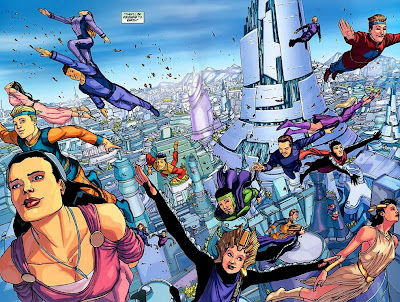The President of the United States in the DC Universe travels to the nation of Markovia to sign what he thinks if the first ever free-trade agreement with them. What is he actually signing?
 That's right -- he's signing a war treaty. That is, the President of the United States is signing an agreement with Markovia in order to engage in intergalactic conflict with New Krypton.
That's right -- he's signing a war treaty. That is, the President of the United States is signing an agreement with Markovia in order to engage in intergalactic conflict with New Krypton.I've heard of peace treaties before (agreements that end war or conflict) and I've heard of treaties that establish an alliance between two nations during war, but I have never actually heard of a war treaty that actually sets out to create a multilateral conflict. It's also bizarre that General Lane implies that all the other nations of the world have already agreed to attack New Krypton and that Markovia would complete the set. Does this mean that the President thought he was signing free-trade agreements with every other nation on Earth? Does the U.S. now have a collection of signed war treaties from every country? "The War Treaty of Switzerland?" Why isn't there just one treaty?
It must be strange living in a world where security is such a major issue. According to a CBS/NYTimes poll from June 2009, 57& of respondents cited the economy and jobs as the most important issue facing the country. Health care got 7%. War and peace was only 2%. In the DC Universe, where global security is constantly threatened, do priorities change? Do health care and the economy take a back seat to global security and intergalactic freedom? And so much so that the world comes to agreement in attacking another planet so quickly and easily?
Apparently so. And yet, the governments of the world still felt the need to keep this agreement from the public. In fact, Project 7734, the government-funded organization in charge of curbing the new threat posed by the Kryptonians, is a furtive operation that not even the President knows he is funding. If security is, in fact, such a major issue, you would think that the taxpayers would be more willing to spend their dollars on it. And I'm sure Project 7734 could accomplish more if it weren't lurking in the shadows. This could only mean that they're planning something so vital to the Earth's future survival that the nations of the world agree to engage in intergalactic conflict, but so nefarious that despite the public's xenophobia, it would likely not support it.
The lesson here: elect a President who reads what he signs.





